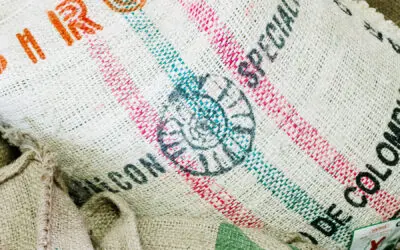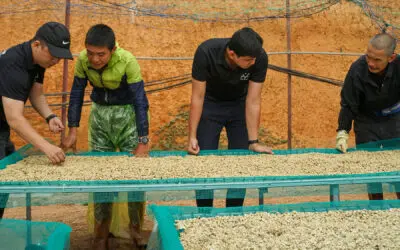In the wake of growing environmental awareness, the world of coffee is undergoing a transformative shift towards sustainability.
Coffee enthusiasts like us are not only seeking the finest beans and brewing methods but also embracing eco-friendly practices that honour the planet. After all, your next cup of coffee could depend on it. Then again, there is also life as we know it (if the two are not the same). In this exploration, I want to touch on the options that allow us to savour our favourite brews while making mindful choices for the environment.
The Environmental Impact of Coffee Production: A Global Concern
Coffee, a cherished beverage enjoyed by millions worldwide, has a significant environmental footprint. We can get caught up in images of humble farmers hand picking the fruit and chic images of bougie cafes, but the coffee industry is intertwined with concerns such as deforestation, intensive water usage, and the carbon footprint associated with production and transportation. Recognizing these challenges, both producers and consumers are increasingly turning their attention to sustainable practices.
Sustainable Coffee Certification: A Guide for Consumers
Certifications play a crucial role in identifying coffee that meets specific environmental and social standards. Various organizations have established criteria for sustainable coffee production, offering certifications that guide consumers toward eco-friendly options.
Lest we forget, coffee growing regions are also migratory bird habitats. So, it should not come as a surprise that bird habitat conservation programs are (coincidentally) some of the strongest ones protecting coffee plantation areas. One of the organizations at the forefront is the Smithsonian Bird Friendly® designation.
Organic Certification
- Coffee labeled as organic is grown without the use of synthetic pesticides, herbicides, or genetically modified organisms (GMOs).
- Organic farming practices prioritize soil health and biodiversity.
- Environmental Benefits: Choosing organic coffee supports farming methods that minimize harm to ecosystems, promote healthier soils, and reduce the impact of harmful chemicals on wildlife.
Fair Trade Certification
- Fair Trade certification ensures that coffee is produced under ethical conditions, with farmers receiving fair wages and adhering to social and labor standards.
- Social Impact: By opting for Fair Trade coffee, consumers contribute to the well-being of coffee-producing communities, fostering economic stability and social development.
Rainforest Alliance Certification
- The Rainforest Alliance focuses on environmental conservation and sustainable farming practices. Coffee with this certification is grown in a manner that promotes biodiversity, soil health, and water conservation.
- Biodiversity Preservation: Rainforest Alliance certification emphasizes the importance of preserving ecosystems, protecting wildlife habitats, and maintaining the delicate balance of biodiversity.
Direct Trade and Relationship Coffee: Empowering Coffee Producers
Direct trade and relationship coffee are emerging trends that prioritize transparency and direct relationships between coffee producers and buyers.
Direct Trade:
- Direct trade involves coffee buyers establishing direct relationships with coffee producers, bypassing traditional intermediaries. This allows for more transparent and fair transactions.
- Economic Impact: Direct trade models empower coffee farmers by ensuring they receive a higher share of the profits, fostering economic stability and community development.
Relationship Coffee:
- Relationship coffee goes beyond transactions; it emphasizes ongoing partnerships between producers and buyers. These relationships often involve collaboration on sustainable farming practices and social projects.
- Sustainability Collaboration: By engaging in long-term relationships, coffee producers and buyers work together to implement and improve sustainable practices, ensuring a positive impact on both the environment and communities.
Eco-Friendly Packaging: Reducing the Footprint of Your Brew
Packaging plays a crucial role in the sustainability of coffee products. As the demand for eco-friendly options grows, coffee brands are exploring innovative and environmentally conscious packaging solutions.
Compostable Bags:
- Compostable coffee bags are made from materials that break down naturally in composting conditions. They offer a sustainable alternative to traditional plastic-lined bags.
- Reducing Plastic Waste: Choosing compostable packaging helps reduce the environmental impact of plastic waste, offering a greener option for coffee lovers.
Reusable Coffee Pods:
- Single-use coffee pods have become a significant environmental concern due to their contribution to plastic pollution. Eco-friendly alternatives, such as reusable coffee pods, offer a sustainable option for pod-based brewing systems.
- Long-Term Savings and Sustainability: Reusable coffee pods not only reduce single-use plastic waste but also provide long-term cost savings for consumers.
Waste Reduction Initiatives: Closing the Loop
Coffee waste, from grounds to packaging, contributes to the industry’s environmental impact. Sustainable coffee practices include initiatives to minimize waste and repurpose byproducts.
Coffee Grounds Recycling:
- Used coffee grounds can be repurposed as fertilizer or compost, diverting them from landfills and providing a valuable resource for soil enrichment.
- Circular Economy: Incorporating coffee grounds into compost or using them for alternative purposes contributes to a circular economy, minimizing waste and promoting sustainability.
Upcycled Products:
- Some innovative companies are transforming coffee-related waste into new products. This includes creating furniture, accessories, and even textiles from recycled coffee grounds or coffee bean bags.
- Creative Sustainability: By supporting products made from upcycled coffee waste, consumers actively participate in reducing the environmental impact of the coffee industry.
Choosing Sustainable Cafés and Roasteries: A Local Impact
Beyond the coffee products we bring into our homes, the choices we make when visiting cafés and roasteries also contribute to the overall sustainability of the coffee industry. Hold their feet to the fire and inquire into their practises and those of their suppliers. We can all talk a good game but are we doing our bit where we can?
Local and Sustainable Sourcing:
- Cafés and roasteries that prioritize local and sustainable sourcing of beans contribute to reducing the carbon footprint associated with transportation.
- Supporting Local Economies: By choosing establishments that support local farmers and sustainable practices, consumers play a role in fostering a resilient and environmentally conscious coffee ecosystem.
Zero-Waste Initiatives:
Some coffee shops are adopting zero-waste initiatives, minimizing single-use packaging and encouraging customers to bring their reusable cups and containers.
Engage in these acts of community engagement wherever you can by supporting cafés with these zero-waste initiatives. It not only reduces environmental impact but also encourages more efforts on the part of the cafe owners. We are all in this together; so, share in the glory.
In Summary
As the world of coffee embraces sustainability, consumers wield the power to drive positive change through their choices. By opting for certified coffee, supporting direct trade relationships, choosing eco-friendly packaging, and patronizing sustainable cafés, coffee enthusiasts become stewards of a more environmentally conscious coffee culture.
Sipping sustainably is not just about the flavour of the coffee; it’s a conscious decision to savour a beverage that aligns with values of environmental responsibility and social impact. With every cup, we embark on a journey towards a more sustainable coffee future, where the pleasure of our favourite brew harmonizes with the well-being of the planet and the livelihoods of coffee-producing communities. Cheers to life beyond the cup—a sip towards a sustainable future.
If this resonates with you (or even if it does not), we look forward to learning from you. Please take a moment to share, follow, comment and subscribe to The Coffee Authority Weekly (if you have not already). Your presence and contribution to the Bean Indigo community is much appreciated. We are grateful in having you here. Let’s grow together!



0 Comments